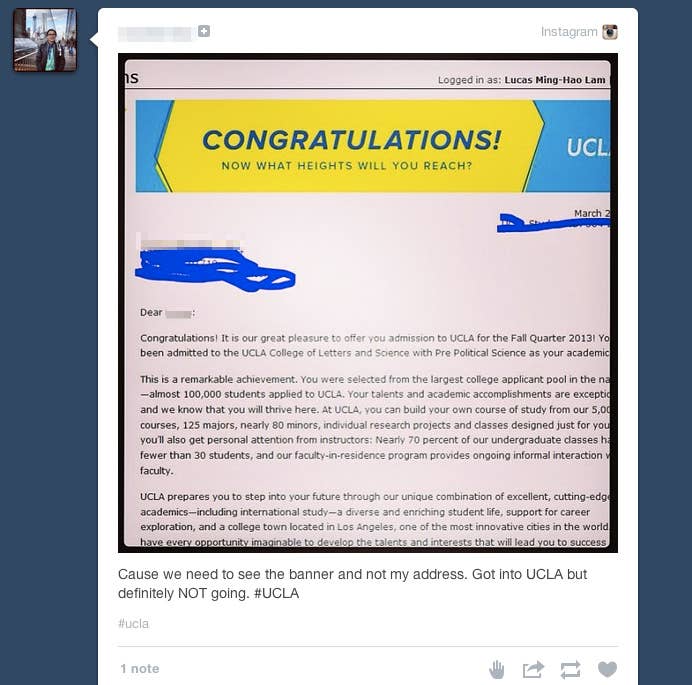
High school counselors, parents, and the press are constantly reminding college applicants to beware of what they post online. One misstep on Facebook could cost you the college of your dreams, they warn.
BuzzFeed spoke with one college admissions counselor at a small competitive liberal arts college in the Northeast — let's call it "College X" — who says the fear of admissions officers stalking prospective students online is justified, but overblown. And that yes, she knows about your Tumblr.
In 2007, I was starting my professional career. Facebook became this thing, this new frontier, and people were asking, 'How will this impact college admissions? What will people know about you?' There were trend pieces about how admissions counselors were constantly searching online and will print out your online profile and put it in your application folder.
I don't think it bore out to be true. It's a set of myths perpetuated by people congregating in online places like College Confidential and the New York Time's Choice blog.
I don't seek out people on social media in a proactive way. I just don't have enough time. We only have a window of a few months to do everything we need to do.
The thing with teenagers is that they say embarrassing shit about themselves all the time. They already overshare with me in the first place. There is enough silly stuff sent directly to us that we can make fun of without having to search through Facebook. For the most part, everything you need to make a decision is in their application or you can get from a conversation with their guidance counselor. You don't need to find more damning evidence. I imagine that even if I made concerted effort to seek it out, it would just confirm what I already know and high school Facebooks are incredibly boring.
Sometimes they put [their profile information] on their resume or send you a link to their Instagram or Youtube videos as part of supplemental material. If I am there, I will look to see what other things are uploaded. Sometimes there will be things that someone wouldn't put in college application — like them smoking a cigarette — but I'm not your mom. I don't care if you smoke. That has no bearing on how I think of you as an applicant.
If I want a little information about the person I might look a little more but you can't see anything anymore in Facebook. People are compulsive un-taggers and they have gotten smart about locking down Facebook. Most kids are smart about stuff like that.
Tumblr is where I inadvertently see pretty personal stuff from kids. It is something people aren't thinking about yet. A few months ago, I happened to be looking through my college tags on Tumblr, and I came across a post from an applicant saying, "I'm applying to [X college] and these other schools, and I don't really want to go to [X.]" That put damper on it. Then the post under that was about her using Ben Wa balls. Just because it isn't Facebook and you're not putting your name on it — I still [have ways to] know who it is.
I inadvertently see tweets that come up when someone is talking about my college on Twitter, too. Unless I'm seeing something about them doing harm to themselves or to someone else, or about someone's integrity in a serious way, I won't bring it up to my boss. Not if it is just kid stuff and bad judgment. I have never seen anything nefarious or troubling.
You hear from guidance counselors and parents to be aware. It is good advice generally but when we talk about Facebook, the conversation has shifted to what is appropriate for our own profiles. There is a lot of talk in the admission and college counseling world, saying 'Is it ok for me to use Facebook to talk to the kids? Should I have two separate accounts? Should I let students friend me?' Admission counselors do embarrassing things all the time, and talk shit about applicants or parents, and get in trouble for that. There have been recent situations where people were fired because of the content on their Facebook page. It goes both ways. Students know my name too. They look at my social media profile. They care who their admissions counselor is.
